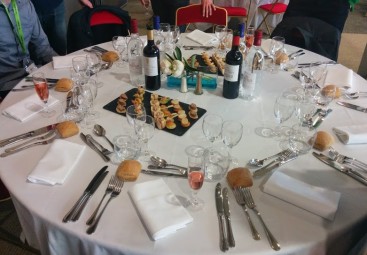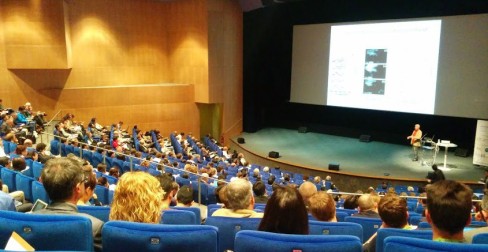OK, let me start this by saying that I’m a PhD student in Condensed Matter Physics. I’ve been lucky to attend a lot of conferences (9 as of writing) during my PhD and it’s taken me a long time to realise I actually don’t like them. At first I figured it was just my own shortcomings because, hey, no-one else seems to have any complaints about them. It’s only when I started asking questions with other students, who are comfortable opening up to you as a peer, that you realise you’re not alone. I’d like to have an open discussion: Conferences can be terrible, at least in my field, and over the next few blog posts I’ll outline the reasons why.
See also Part 2 on socialising, Part 3 on poster sessions and Part 4 on value for money.
Firstly, the harsh truth: a large number talks are poor quality.
Reading tiny unexplained graphs or pages of equations ‘clearly’ showing something according to the speaker. Check. No motivation, explanation or clear message of why this work is important. Check. Speaker reading ad verbatim from a wall of text on a slide. Check. You get the point. These problems are so widespread that you can now play bad presentation bingo thanks to the RSC (http://prospect.rsc.org/blogs/cw/wp-content/uploads/2010/02/bingo.jpg).
For the first couple of years I was convinced I must be the the only person in the room who didn’t really understand many of the presentations. This ended thanks to a lunch break at a recent conference chatting to some PhD student friends. There was the reluctant admission that in fact none of us had understood much of what’s been said for the entire morning session. While it’s comforting to find you’re not alone, it raises the question of what is the point of spending many hours and hundreds, maybe thousands of Euros for travel, boarding and conference fees for the opportunity to sit through hours of talks that many people in the room don’t get much value from?
It’s a problem we don’t like admitting to
This lack of understanding of conference talks is a huge, common problem that we don’t like admitting to, because it calls in to question your ability as an academic. Talking with friends who are PhD students or more senior and also in other fields reveals a similar story – it’s a norm that we silently comply with. I feel this is a massive failing of the academic community. It is contradictory that in academia we encourage the questioning and critiquing of ideas but to do the same with someone’s presentation skills is unheard of. More critically, it is both alienating and really inefficient to waste the time of young researchers.

Conferences can have their plus points
Take notes from science outreach programs
I’ve heard the advice to simply skip talks that you aren’t familiar with and go off exploring, but to me this seems like sticking your head in the sand. It’s more than a little crazy that this is the common advice for academic conferences in 2015, a year when excellent communication and outreach programs like Thesis in Three and Pint of Science exist and the emphasis is on clear and concise communication of your research. Conferences should be the strong backbone of every academic field – it is after all the best opportunity to meet with your peers and tell them what you’ve been up to. In my opinion at least, the entire current process needs an overhaul, and taking some notes from successful science communication programs would be a great start.
What are your views of conferences? Have you ever been to a conference where the organisers did something different and interesting you think worked well? Comments below or send me a tweet @Owl_Meat

Pingback: Harsh truths and bad conferences (Part 2) | Owl_Meat
I’ve often had similar thoughts about presentation skills, even attempting to come up with a negative correlation between best papers and talk quality (need more data!)
At the same time, I have to keep reminding myself that most are presenting in a language that is not their native one, and some Phd students especially are under tremendous pressure. Last year at a conference I was at one student was so visibly stressed that he fainted and almost fell off the podium during a talk.
One the other hand, I’ve always found conferences very good fun indeed (Someone once described them as summer camp for adults), especially Stateside. For some reason, I’ve found that I always managed to meet a local US-based mentor who helped introduce me to some people and by the end I find myself singing Journey songs in a karaoke bar in Baltimore with a prominent psycholinguistics professor. And I’m in computer science, a field not known for its gregariousness.
At the same time, despite perhaps being on the more social side myself, I do find conferences very tiring, after about two days there is really not much more I can take in. One interesting approach to this in a computational linguistics conference I’ve been to a few times is to have an excursion day in the middle of the conference, which helps very much the casual socialising that is difficult when you are in the thick of it.
I do agree that there should be more social events, maybe a sort of academic “speed dating” for younger academics, maybe based on shared research interests. Summer schools I found very useful for getting to know people on a deeper level, as they generally have a high number of social events, however I don’t know if they exist in all fields.
LikeLike
Funny, while you wrote your comment on speed dating, I wrote the same below part II of this series. Maybe we should really try that once. See if it works.
LikeLike
I personally try NOT to listen to one talk every hour, otherwise it is hard for me to have the energy to concentrate well enough to get the talks that are important for me. That is almost part of making a program.
You do not have to get the entire talk. At least a part of it is often for the direct colleagues. The talk is mainly an advertisement, to see who is doing similar work, someone to talk about afterwards. Sometimes you can copy an idea for a measurements method, analysis technique or plot.
If a session is not that important for you, you can use that time to talk to your PhD friends (fits to your second part of this series) and to arrange a diner or drinks appointment for the evening.
Just some ideas. Maybe the culture in your field is also simply not that good. One of the great things of studying physics is that you can work in many fields of study. Some years ago I switched fields and one of the reasons was that I felt much more welcome in my new field.
LikeLike
Pingback: Harsh truths and bad conferences (Part 3) – Poster sessions | Owl_Meat
Pingback: Wall Street National | Going To An Academic Conference? Here Are Some Tips - Wall Street National
Pingback: Going To An Academic Conference? Here Are Some Tips - MorningStandard.com
Pingback: Making the most of academic conferences | Weekademia
Pingback: Nobelpreisträger als gute und schlechte Vorbilder oder: Der zweifelhafte Sinn wissenschaftlicher Vorträge bei Konferenzen – Astrodicticum Simplex
Pingback: Harsh truths and bad conferences (Part 4) – Value for money | Owl_Meat